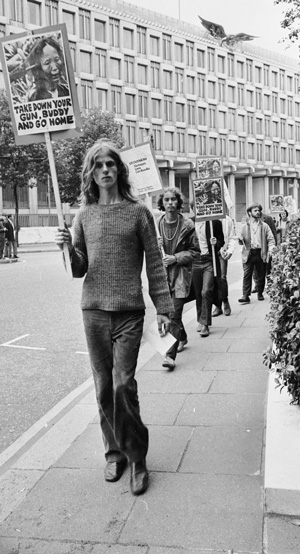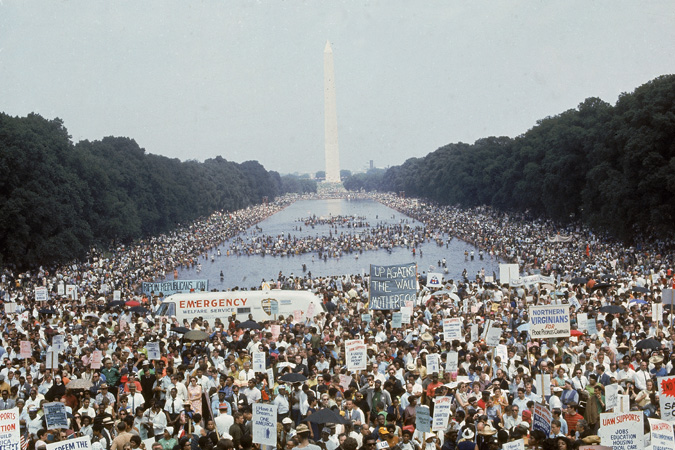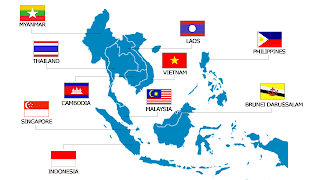Follow the Thai version : http://www.prachatai.com/journal/2011/11/37910
The contradictions of the Arab Spring |
|
The spirit of 1968 flows through Arab Spring and Occupy movement - as its counter-current attempts to suppress uprising. |
In 1968, socially and economically marginalised groups of people protested in a global movement [GALLO/GETTY]
The turmoil in Arab countries that is called the Arab Spring is conventionally said to have been sparked by the self-immolation of Mohamed Bouazizi in a small village of Tunisia on December 17, 2010. The massive sympathy this act aroused led, in a relatively short time, to the destitution of Tunisia's president and then to that of Egypt's president. In very quick order thereafter, the turmoil spread to virtually every Arab state and is still continuing.
Most of the analyses we read in the media or on the internet neglect the fundamental contradiction of this phenomenon - that the so-called Arab Spring is composed of two quite different currents, going in radically different directions. One current is the heir of the world-revolution of 1968. The "1968 current" might better be called the "second Arab revolt".
Its objective is to achieve the global autonomy of the Arab world that the "first Arab revolt" had sought to achieve. The first revolt failed primarily because of successful Franco-British measures to contain it, co-opt it, and repress it.
The second current is the attempt by all important geopolitical actors to control the first current, each acting to divert collective activity in the Arab world in ways that would redound to the relative advantage of each of these actors separately. The actors here regard the "1968 current" as highly dangerous to their interests. They have done everything possible to turn attention and energy away from the objectives of the "1968 current", in what I think of as the great distraction.
The past didn't go anywhere
What do I mean by a "1968 current"? There were two essential features to the world-revolution of 1968 that remain relevant to the world situation today. First, the revolutionaries of 1968 were protesting against the inherently undemocratic behaviour of those in authority. This was a revolt against such use (or misuse) of authority at all levels: the level of the world-system as a whole; the level of the national and local governments; the level of the multiple non-governmental institutions in which people take part or to which they are subordinated (from workplaces to educational structures to political parties and trade-unions).
 |
| The '1968 current' refers to a revolution of the 'forgotten peoples' [GALLO/GETTY] |
In language that was developed later on, the 1968-revolutionaries were against vertical decision-making and in favour of horizontal decision-making - participatory and therefore popular. By and large, although there were exceptions, the "1968 current" was deeply influenced by the concept of non-violent resistance, whether in the version of
satyagraha developed by Mahatma Gandhi or that pursued by Martin Luther King and his collaborators, or indeed older versions such as that of Henry David Thoreau.
In the "Arab Spring" we could see this current strongly at work in Tunisia and Egypt. It was the rapid public embrace of this current that terrified those in power - the rulers of every Arab state without exception, the governments of the "outside" states who were an active presence in the geopolitics of the Arab world, even the governments of very distant states.
The spread of an anti-authoritarian logic, and especially its success anywhere, menaced all of them. The governments of the world joined forces to destroy the "1968 current".
A growing world movement
So far, they have not been able to do it. Indeed, on the contrary, the current is gaining force around the world - from Hong Kong to Athens to Madrid to Santiago to Johannesburg to New York. This is not solely the result of the Arab Spring, since the seeds and even the revolts elsewhere predated December 2010. But the fact that it has occurred so dramatically in the Arab world, once thought relatively unresponsive to such a current, has added considerable momentum to the growing world movement.
How have the governments responded to the threat? There are really only three ways to respond to such a threat - repression, concessions and diversion. All three responses have been used, and up to a certain point, their use has achieved some success.
Of course, the internal political realities of each state are different, and that is why the dosage of repression, concessions and diversion has varied from state to state.
However, the decisive characteristic is, in my view, the second feature of the world-revolution of 1968. The world-revolution of 1968 included in a very major way a revolution of the "forgotten peoples" - those who had been left out of the concerns of the major organised forces of all political stripes. The forgotten peoples had been told that their concerns, their complaints, their demands were secondary and had to be postponed until some other primary concerns were resolved.
Who were these forgotten peoples? They were first of all women, half the world's population. They were secondly those who were defined in a given state as "minorities" - a concept that is not really numerical but rather social (and has usually been defined in terms of race or religion or language or some combination thereof).
In addition to women and the social "minorities", there exists a long list of other groups who also proclaimed their insistence on not being forgotten: Those with "other" sexual preferences, those who were disabled, those who were the "indigenous" populations in a zone that had been subject to in-migration by powerful outsiders in the last 500 years, those who were deeply concerned with threats to the environment, those who were pacifists. The list has continued to grow, as more and more "groups" became conscious of their status as "forgotten peoples".
As one analyses Arab state after Arab state, one realises quite quickly that the list of forgotten peoples and their relation to the regime in power varies considerably. Hence, the degree to which "concessions" can limit revolt varies. The degree to which "repression" is easy or difficult for the regime varies. But make no mistake about it, all regimes want, above all, to stay in power.
One way to stay in power is for some of those who are in power to join the uprising, casting overboard a personage who happens to be the president or ruler in favour of the pseudo-neutral armed forces. This is exactly what happened in Egypt. It is that about which those who are today reoccupying Tahrir Square in Egypt are complaining as they seek to reinvigorate the "1968 current".
The problem for the major geopolitical actors is that they are not sure how best to "distract" attention and advance their own interests amidst the turmoil. Let us look at what the various actors have been trying to do and the degree to which they have been successful. We will then be able better to assess the prospects of the "1968 current" today and in the relatively near future.
Ex-colonial redemption
We should start the story with France and Great Britain - the fading ex-colonial powers. They were both badly caught with their pants down in Tunisia and Egypt. Their leaders had, as individuals, been personally profiting from the two dictatorships. They not merely supported them against the uprising, but actively counselled them on how to repress.
Finally, and very late, they realised how big a political error this had been. They had to find a way to redeem themselves. They found it in Libya.
Muammar Gaddafi had also, just like the French and the British, fully supported Zine El Abidine Ben Ali and Hosni Mubarak. Indeed he went the furthest, deploring their resignations. He was obviously deeply frightened by what was happening in the two neighbouring countries. To be sure, there was not much of a true "1968 current" in Libya. But there were plenty of discontented groups. And when these groups began their revolt, he blustered about how hard he would repress them.
France and Great Britain saw their opportunity here.
 |
| 'The 1968 current is expanding, despite recession, despite concessions, despite co-option' [GALLO/GETTY] |
Despite the degree to which these two countries (and others) had engaged in profitable business in Libya for at least a decade, they suddenly discovered that Gaddafi was a terrible dictator, which no doubt he was. They set out to redeem themselves by open military support for the Libyan rebels.
Today, Bernard-Henri Lévy is boasting of the way in which he created a direct link between President Sarkozy of France and the structure of the Libyan rebels on the basis of active intervention to promote human rights.
But France and Great Britain, however determined, were unable to unseat Gaddafi without help. They needed the United States. Obama was obviously reluctant at first. But, under internal US pressure ("to promote human rights"), he threw in US military and political assistance to what was now called a NATO effort. He did this on the basis that, in the end, he could argue that not a single US life was lost - only Libyan lives.
Just as Gaddafi was unnerved by the ousting of Mubarak, so were the Saudis. They saw Western acquiescence (and subsequently approval) of his departure as a highly dangerous precedent. They decided to pursue their own independent line - the defence of the status quo.
They defended it first of all at home, secondly in the Gulf Coordination Council (and in particular in Bahrain), then in the other monarchies (Jordan and Morocco), then in all Arab states. And in the two neighbouring countries in which there was most turmoil - Yemen and Syria - they began to pursue a mediation in which everything would change so that nothing would change.
A current not easily contained
The new Egyptian regime, under attack at home from the "1968 current" and always sensitive to the fact that Egypt's primacy in the Arab world had diminished seriously, began to revise its geopolitical stance, first of all
vis-à-vis Israel.
The regime wanted to take its distance from Israel, without, however, jeopardising its ability to obtain financial assistance from the United States. They became an active advocate of reunification of the split Palestinian political world, hoping that this reunification would not only force significant concessions from the Israelis but hamper the development of the "1968 current" among the Palestinians.
 |
| The global spirit of protest won't be easily contained [GALLO/GETTY] |
Two neighbouring countries - Turkey and Iran - sought to profit from the Arab unrest by strengthening their own legitimacy as actors in the Middle East arena. This was not easy for either of them, especially since each had to worry about the degree to which the "1968 current" would menace them internally - the Kurds in Turkey, the multiple factions in the complicated Iranian internal politics.
And Israel? Israel has been assaulted all around by the prospect of "delegitimisation" - in the Western world (even in Germany, even in the United States), in Egypt and Jordan, in Turkey, in Russia and China. And all the while it has had to face a "1968 current" that has emerged among the Jewish population within Israel.
And, as all this geopolitical juggling has been going on, the Arab Spring has become simply one part of what is now very clearly a worldwide unrest occurring everywhere: Oxi in Greece, indignados in Spain, students in Chile, the Occupy movements that have now spread to 800 cities in North America and elsewhere, strikes in China and demonstrations in Hong Kong, multiple happenings across Africa.
The "1968 current" is expanding - despite repression, despite concessions, despite co-option.
And geopolitically, across the Arab world, the success of the various players has been limited, and in some cases counterproductive. Tahrir Square has become a symbol across the world. Yes, many Islamist movements have been able to express themselves openly in Arab states where they could not do so earlier. But so have the secular left forces. The trade unions are rediscovering their historic role.
Those who believe that Arab unrest, that world unrest, is a passing moment will discover in the next major bubble burst (which we can anticipate quite soon) that the "1968 current" will no longer be so easily contained.
Immanuel Wallerstein is a professor in the department of sociology at Yale University and author of some 30 books, including The Modern World System - published in four volumes, with a further two anticipated. Prof Wallerstein's decades of work, critical of global capitalism and supporting 'anti-systemic movements' have led to him being recognised as a world-renowned expert in social analysis.
The views expressed in this article are the author's own and do not necessarily reflect Al Jazeera's editorial policy.
Credit : http://www.aljazeera.com/indepth/opinion/2011/11/20111111101711539134.html
http://www.aljazeera.com/indepth/opinion/profile/immanuel-wallerstein.html





